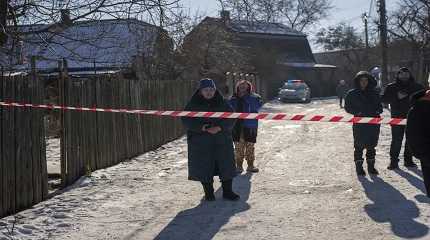
KYIV, Ukraine (AP) — Russia unleashed strategic bombers, killer drones and rockets in a barrage of attacks across Ukraine early Friday, as a military push by Moscow that Kyiv says has been brewing for days appeared to pick up pace ahead of the one-year anniversary of its invasion.
The Kremlin’s forces focused their bombardments on Ukraine’s industrial east, especially the Luhansk and Donetsk provinces that make up the industrial Donbas region where fighting has recently been most intense, the Ukrainian military said. Moscow-backed separatists have been fighting Ukrainian forces there since 2014.
But the barrage went further, also taking aim at the capital, Kyiv, and Lviv, near Ukraine’s Western border with Poland. It also struck critical infrastructure in Kharkiv, Ukraine’s second-largest city in the northeast. Seven people were wounded there, two of them seriously, regional Governor Oleh Syniehubov said.
Air raid sirens went off across much of the country. The Ukrainian Air Force said its defenses destroyed five Kalibr missiles and five Iranian-made killer drones.
The bombardments could be an effort by Russia to soften up Ukraine’s defenses ahead of a ground assault, which Kyiv believes Moscow is planning in the east where the Kremlin is striving to secure areas it has illegally annexed and where it claims its rule is welcomed.
In the Donetsk region, local Ukrainian officials reported that the Russian military deployed additional troops and launched offensive operations. “There is a daily escalation and Russian attacks are becoming active throughout the region,” Gov. Pavlo Kyrylenko said.
In Luhansk province, the Russian army is trying to punch through Ukrainian defenses, according to regional Gov. Serhii Haidai.
“The situation is deteriorating, the enemy is constantly attacking, the Russians are bringing in a large amount of heavy equipment and aircraft,” Haidai said.
There has been little change in battlefield positions for weeks.
Also Friday, Moldova’s Ministry of Defense said that a missile was detected traversing its airspace near the border with Ukraine. Moldova’s foreign ministry said in a statement that the Russian ambassador in Chisinau has been summoned for talks over the “unacceptable violation”.
The ministry said that the missile was detected in its airspace at around 10 a.m. and flew over two border villages before heading toward Ukraine.
The spokesperson for Ukraine’s Air Forces, Yurii Ihnat, told The Associated Press that another missile crossed the airspace of Romania, a NATO member country. Romania’s defense ministry denied that, however, saying the closest the missile came to Romania’s airspace was approximately 35 kilometers (20 miles).
High-voltage infrastructure facilities were hit in the eastern, western and southern regions, Ukraine’s energy company, Ukrenergo, said, resulting in power outages in some areas. It was the 14th round of massive strikes on the country’s power supply, the company said. The last one occurred on Jan. 26 as Moscow seeks to demoralize Ukrainians by leaving them without heat and water in the bitter winter.
Zaporizhzhia City Council Secretary Anatolii Kurtiev said the city had been hit 17 times in one hour, which he said made it the most intense period of attacks since the beginning of the full-scale invasion on Feb. 24, 2022.
Ukraine’s Air Force shot down 10 Russian missiles over Kyiv, according to the Kyiv City Administration. The fragments of one missile damaged two cars, a house and electricity wires. No casualties were reported.
The Ukraine Air Force said Russia launched up to 35 S-300 anti-aircraft guided missiles on the Kharkiv and Zaporizhzhia provinces. Those missiles cannot be destroyed in mid-air by air defenses but they have a relatively short range so the Russians have used them for attacks on regions not far from Russian-controlled territory.
The Khmelnytskyi province in Western Ukraine was also attacked with Shahed drones, according to regional Gov. Serhii Hamalii.
Russia has in the past used Iranian-made Shahed drones to strike at key Ukrainian infrastructure and sow fear among civilians, according to Western analysts. They are known as suicide drones because they nosedive into targets and explode on impact like a missile.
The onslaught lent a sense of urgency to Ukraine’s pleas for more Western military support. The need prompted Ukrainian President Volodymyr Zelenskyy to make a rare — and daring — two-day trip abroad this week to press allies to grant Kyiv more aid.
Due to the threat of a missile attack, emergency power outages were enacted in Kyiv city, the Kyiv and Dnipropetrovsk regions, according to private energy operator DTEK.
The head of Kyiv City Administration, Serhii Popko, said that Russian Tu-95 strategic bombers, which can carry cruise missiles, were in the air.
Kyiv Mayor Vitali Klitschko said that fragments of a Russian rocket fell in the Kyiv region and damaged a private house and a car.
A Russian rocket fell but did not explode in Ukraine’s western Lviv province Friday, according to regional Gov. Maksym Kozytskyi. Kozytskyi said on Telegram that there were no victims when the rocket fell close to a village bus stop.
Moscow’s ambitions have narrowed since it launched its full-scale invasion, when the capital Kyiv and the installation of a puppet government were among its targets. It is now focusing its efforts on gaining full control of the Donbas.
Numerous battlefield setbacks, including yielding eastern areas it had initially captured, have embarrassed Russian President Vladimir Putin.




